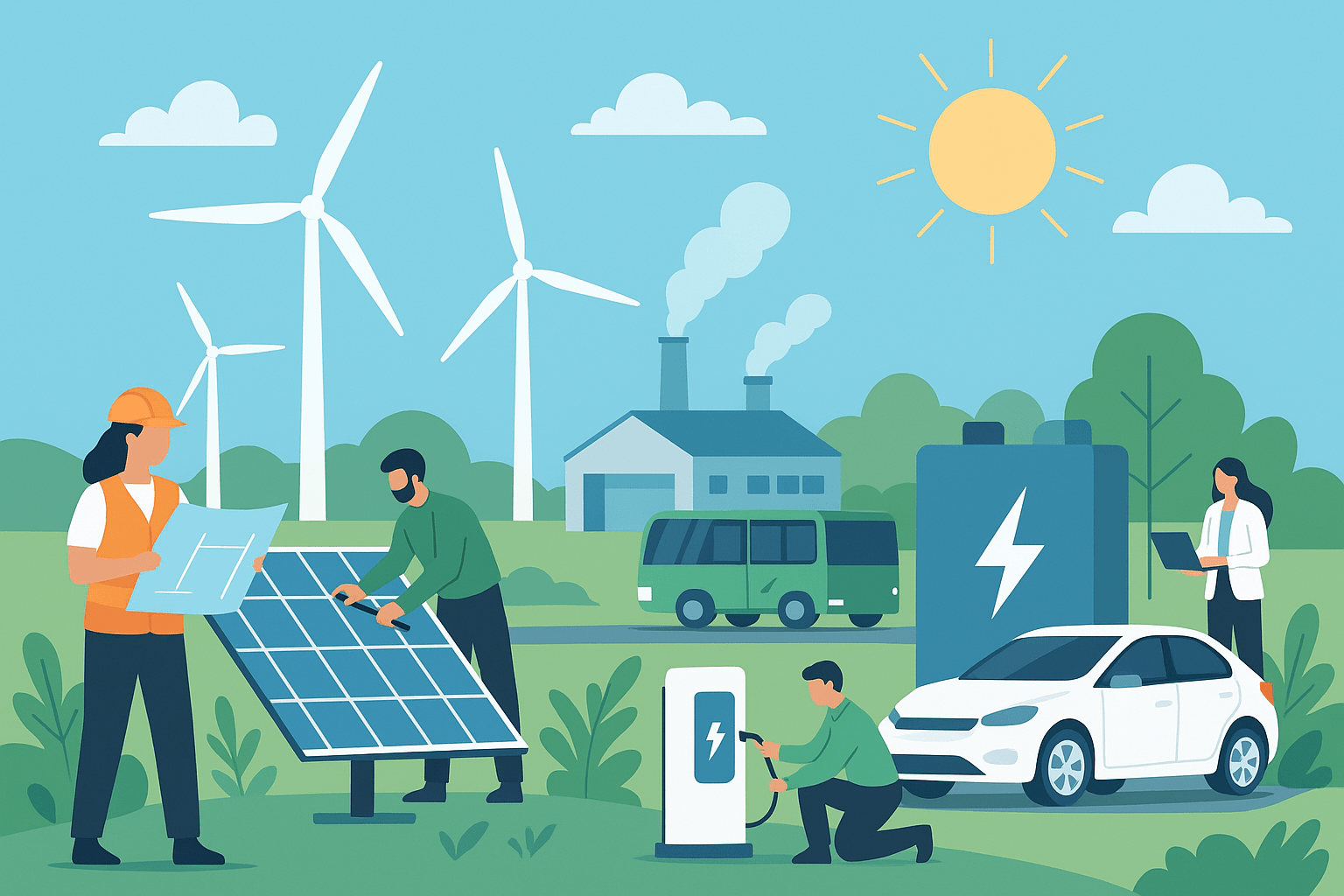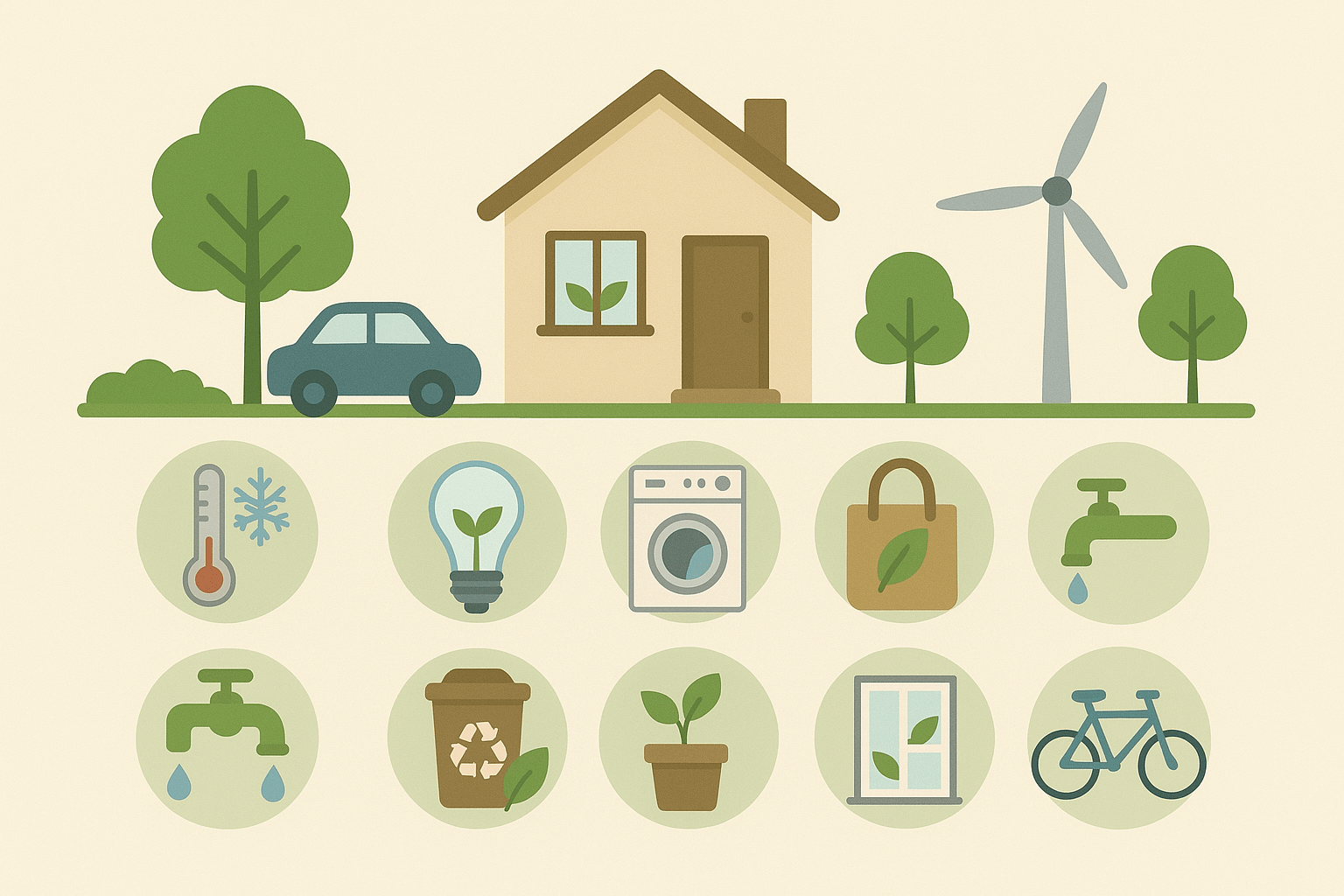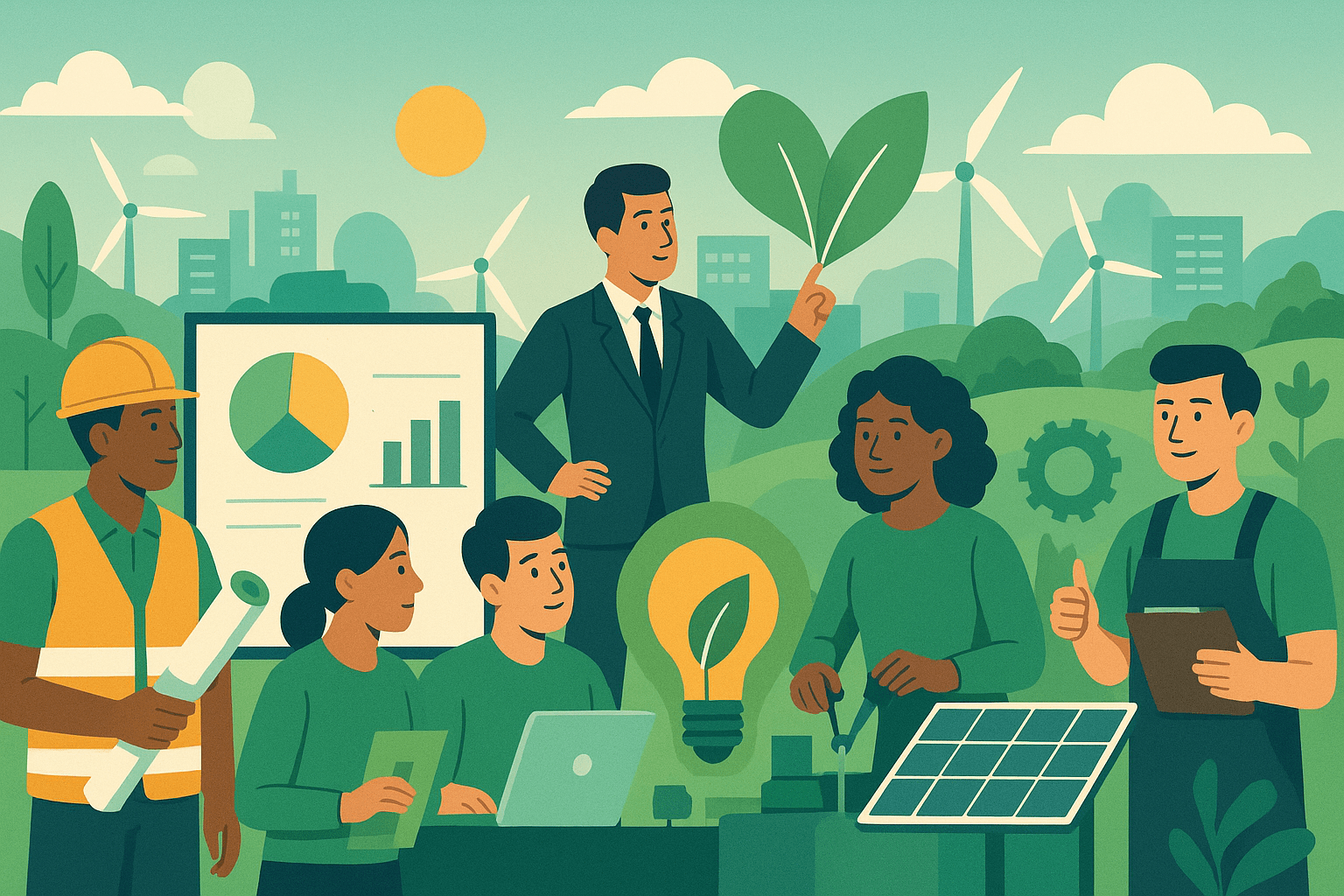Introduction
As global industries invest in cleaner technologies and governments strengthen climate commitments, interest in green jobs and the skills needed to get them continues to rise. Although the green transition is long-term, recent insights from 2025, including strong job forecasts, renewable energy expansion, and accelerating climate policies, highlight just how rapidly sustainable careers are taking shape. Organisations like the World Economic Forum, C40 Cities, and the European Environment Agency report record growth and rising skills demand, showing that the green workforce is becoming one of the world’s most important labour transformations.
What’s Driving the Growth of Green Jobs
Clean Energy Expansion Accelerating in 2025
Global investment in solar, wind, hydrogen, and battery technology surged between 2024 and 2025, creating millions of new job openings across engineering, construction, operation, and maintenance roles.
The World Economic Forum forecasts a net gain of 9.6 million green jobs by 2030, driven by global investments in clean energy, sustainability, and low-carbon technologies
Cities Pushing Green Employment
C40 Cities reported in 2025 that 21 million green jobs existed across its network, with a goal of reaching 50 million by 2030, showing that urban policy is a major engine of green job growth.
Corporate Climate Strategy Becoming Standard
In 2025, more companies than ever began integrating ESG, decarbonisation, and sustainable procurement into their business models, expanding demand for sustainability professionals, data analysts, environmental managers, and compliance specialists.
The European green job market surged from 13.7 million in 2022 to 16.2 million in 2023, highlighting strong growth in renewable energy and sustainability-focused industries
Stronger Climate Policy Worldwide
Net-zero strategies, clean energy incentives, and efficiency regulations introduced before and during 2025 have strengthened long-term demand for trained green talent across energy, transport, and construction sectors.

The Key Sectors Creating the Most Green Jobs
1. Renewable Energy
Solar PV, offshore wind, hydrogen facilities, and battery storage projects are expanding across Europe, Asia, and the Americas, offering stable long-term employment.
2. Sustainable Construction & Energy Efficiency
2025 saw a rise in heat pump installations, building retrofits, and energy-efficient design, transforming everything from HVAC work to architectural practices.
3. Sustainable Mobility & EV Infrastructure
Electric vehicle production and charging infrastructure continue to scale, with 2025 marking a major year for EV targets and investments worldwide.
4. Circular Economy & Waste Innovation
Environmental design, materials recovery, textile recycling, and zero-waste manufacturing are emerging as major green job sources.
5. Green Finance & ESG Careers
Sustainable finance expanded significantly in 2025, with major financial hubs strengthening their climate-reporting systems and green investment branches.
Green investment, ESG analysis, and climate-risk management are expanding quickly, with London rising as a global financial hub for sustainable finance.
Green Jobs and the Skills Needed to Get Them
Core Technical Skills for Green Careers
To enter the green workforce, candidates benefit from developing skills such as:
- Renewable energy systems operation
- Heat pump and HVAC efficiency
- Smart-grid and energy monitoring technologies
- Environmental modelling and data analysis
- Sustainable building and construction methods
- Circular economy design principles
Digital Skills That Boost Green Employability
In 2025 and beyond, digital capability is becoming essential, including:
- GIS tools for environmental planning
- Energy analytics software
- Building Information Modelling (BIM)
- IoT systems used in smart buildings
- Automation and predictive maintenance tech
Soft Skills for Long-Term Growth
- Climate literacy
- Systems thinking
- Cross-disciplinary collaboration
- Adaptability and willingness to reskill
- Problem-solving in eco-focused environments
How Workers Can Build Green Skills
Reskilling pathways have expanded significantly since 2025, including:
- Online micro-credentials
- Vocational courses
- Industry certifications
- Apprenticeships in clean energy and construction
- Green leadership and sustainability programmes
Challenges Influencing the Green Workforce
Skills Shortages Highlighted in 2025
Reports in 2025 show that demand for green-skilled workers is rising faster than supply, especially in renewable energy and energy-efficient construction.
Regional Differences in Job Growth
Some countries invest heavily in green transition efforts, while others lag behind, creating uneven access to opportunities.
Ongoing Need for Scalable Training
The rapid growth observed in 2025 highlighted the need for more accessible and standardised training, apprenticeships, and certification pathways.
Demand for green talent is outpacing supply. Hiring is increasing faster than the number of workers with green skills can match.
High-Demand Green Job Roles
Roles that consistently show strong, long-term demand include:
- Solar PV installers
- Wind turbine technicians
- Heat pump specialists
- Sustainable construction workers
- Environmental engineers
- ESG analysts
- EV charging technicians
- Energy auditors
- Sustainability consultants
These jobs were in high demand in 2025 and are projected to remain critical for decades.
Regions With Strong Green Job Growth
While growth varies worldwide, regions showing consistent long-term demand include:
- The European Union
- The United Kingdom
- The United States
- Canada
- Japan
- South Korea
- Australia
These areas are investing heavily in clean energy, mobility, and climate-resilient development, creating reliable pathways for future workers.
Closing Thoughts
Green careers are becoming a cornerstone of the global workforce, offering stable, meaningful, and future-proof opportunities. Understanding green jobs and the skills needed to get them is essential for anyone preparing for long-term employment in a sustainable economy. With strong growth momentum shown through 2025 and continuing in the following years, workers who invest in green skills, from renewable energy expertise to digital proficiency, will be well positioned for success in one of the world’s fastest-growing fields. As climate goals expand and industries innovate, the green workforce will remain central to global progress, economic resilience, and the future of work.


